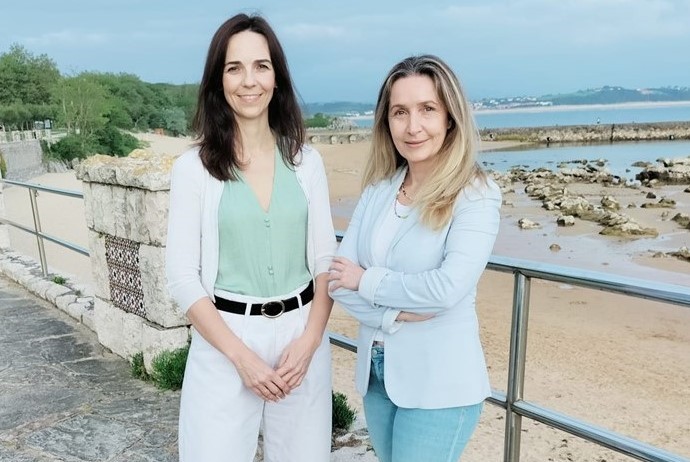Jara Martínez reports the objectives of her administration as the new dean of the Demarcation of Cantabria of the College of Civil Engineers
The objectives of her management will be to defend the profession, value the role of engineering in society, attract young talent, facilitate access to new technologies and knowledge, and promote strategic alliances
Jara Martínez Sánchez, who is part of the Coastal Engineering and Management Group of the Environmental Hydraulics Institute of the University of Cantabria (IHCantabria), took office as dean of the Demarcation of Cantabria of the College of Civil Engineers (CICCP, by its acronym in Spanish), together with Conchi Ortega as vice-dean, on July 24. The new Governing Board that they preside will be in force for two years.
The news of her appointment as dean of the Demarcation of Cantabria of this professional association is “a great personal and professional challenge” for Jara Martínez, who has been linked to IHCantabria since 2008. “We approach the project of these two years of legislature with great enthusiasm and with great strength,” says the new dean.
For the development of her management, Jara Martínez says she has “a great team of professionals in the Governing Board”: Conchi Ortega, as vice-dean, and eight members, including José Luis Moura ─professor at the University of Cantabria, in the School of Civil Engineering (ETSICCP, by its acronym in Spanish)─, Felipe Collazos, Marina Ojanguren, Virginia Cabrillo, Francisco José Gómez, Marianela García, Ignacio Galilea and Carlos García, “who represent practically all the professional sectors covered by civil engineering”.
Objectives of the new Governing Board of the CICCP’s Demarcation of Cantabria
The plan of activities of the recently constituted Governing Board establishes, as priority objectives: to defend the collective in the exercise of the profession, to value the role of engineering in society, to attract young talent, to facilitate access to new technologies and knowledge, as well as to strengthen the social network and to strengthen strategic alliances.
In this line, Jara Martínez points out that one of the obligations of the CICCP, as a public law body, is to ensure that only graduates in full exercise of their competencies carry out the activities of the profession they represent. “Our intention is to continue defending the profession and fighting against intrusiveness in the courts, when necessary; but, above all, outside them, through communication initiatives.”
For this reason, another of the objectives is centered on valuing engineering in society, “making visible the diversity of the engineering work that we cover, as well as its great impact on the lives of people and the development of societies”. In coherence with this objective, “the attraction of young talent to what we believe is a profession of great value and with a great future” is proposed.
Martinez recognizes that one of the pillars on which any profession is based is the knowledge and technical skills necessary for its practice; therefore, the CICCP wishes to contribute to this pillar, facilitating access to new technologies and knowledge.
“We believe that it is essential to encourage the development of more strategic interactions between colleagues of the association itself and also with other groups,” says the dean. Hence, during her tenure she proposes to promote collaboration between the professional association she represents and the School of Civil Engineering of the University of Cantabria, as well as with IHCantabria. “Membership is not mandatory for teachers and researchers, as long as they do not also develop applied engineering activities, but we want to attract these professionals to the association, in order to jointly address the priority objectives we share, such as attracting young talent and training, combining our respective communication resources”.
Background and profile of the dean of the Demarcation of Cantabria of the CICCP
The change in the Governing Board of the Demarcation of Cantabria of the CICCP occurred after the resignation of Ezequiel San Emeterio as its dean, which occurred last February 1st. Since then, the Governing Board assumed its responsibilities on a provisional basis and called for elections on April 30th, for which only one candidacy was registered, the one proposed by Jara Martínez and Conchi Ortega.
Regarding Jara Martínez’s professional profile, it is worth mentioning that she holds a PhD in Science and Technologies for Coastal Management and a Master’s Degree in Port and Coastal Engineering from the University of Cantabria.
She started her professional career in the private sector, as project manager at KV Consultores. In 2008, she joined IHCantabria, where she has participated in more than 35 consulting and research projects. Her main areas of work include monitoring and numerical modeling of coastal hydro-modynamic processes; coastal engineering, coastal risk assessment and management, and strategic planning for coastal protection and adaptation to climate change.
She also has experience in scientific dissemination and communication activities, highlighting her participation in a documentary series of the Demarcation of Cantabria of the CICCP that reflects the view that 9 collegiate of three different generations have on the profession, including Jara Martinez, as a representative of the generation called “The Change”. “The previous Board has been making in recent years a great effort to make visible the engineers of the region, which we want to continue”, says Martínez.
Her proclamation as dean marks the beginning of a new stage for the Demarcation of Cantabria of the CICCP, with the promise of “continuing to strengthen the profession and its impact on society”.

Members of the new Governing Board of the Demarcation of Cantabria of the CICCP

Jara Martínez and Conchi Ortega, dean and vice-dean of the CICCP’s Demarcation of Cantabria, respectively



